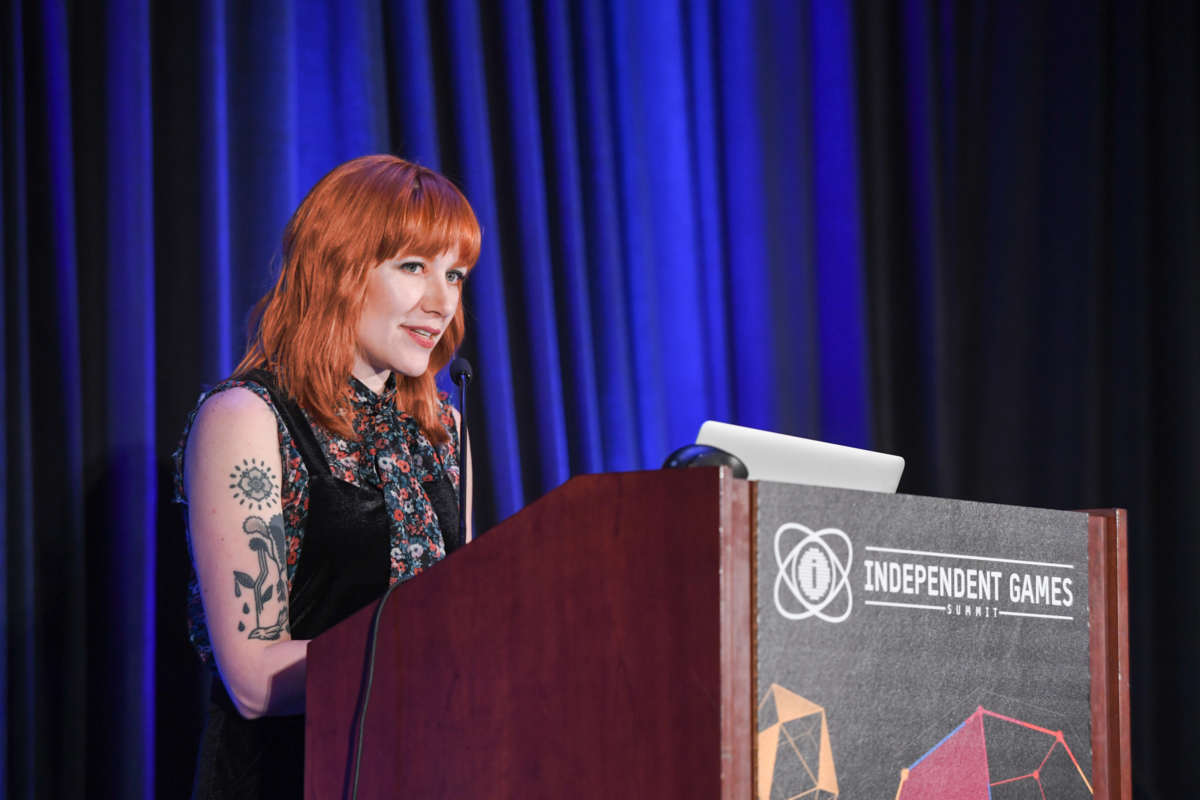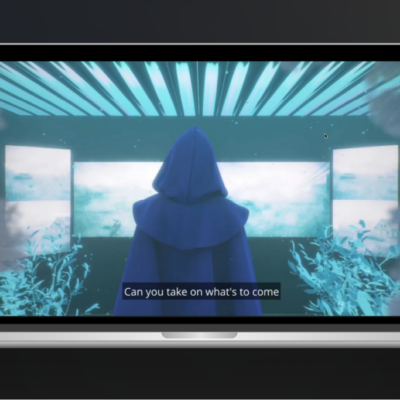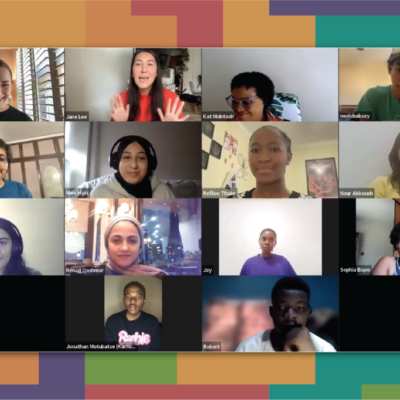
Brie Code: Cultivating "Tru Luv" for Video Games
"Most people who follow me seem to be playing video games more for what they wish they were than what they are. We all tend to agree that games as a medium has so much, so much potential and that we are just beginning to explore what that potential is." - Brie Code
When indie game developer Brie Code—author of the fantastic "Video Games Are Boring"—joined iThrive Games for our February design hive, we were inspired by the depth and openness of her thinking, her cool, calm demeanor, her adventurous travel style, her awesome tattoos, and the fact that she makes games with people who don't like games. We were so intrigued—what inspires her to do this, and what disservice are developers doing when they make games only with people who already love them in mind? How can developers cast a larger net and make new converts of people who haven't yet experienced the transformative potential of games? Brie generously provided some insights into the workings and philosophy of her new studio, Tru Luv Media, and what games have meant for her personal learning and growth.
MB: You founded Tru Luv Media to make video games with and for people who don't like video games. What inspired you to take this on? Why is it important to you to reveal the power of video games to this audience?
BC: All my life I've had friends who don't like video games. We share the same tastes in music, film, art, even food. My friend Kristina, for example. We like all the same things except video games. But then three years ago her husband's brother gave her his old PlayStation 3 and she asked me if there was anything she should play. I was thrilled, and I recommended the game Journey. It turns out she didn't like it as much as I thought she might, but it did intrigue her enough to try a few more games.
At some point, I recommended my favourite game, Skyrim. She looked it up online and laughed and said she wasn't interested. She doesn't like medieval fantasy and she doesn't like violence. A few weeks passed. And then one evening she phoned me and she was crying because she had accidentally killed one of the characters in Skyrim, Lydia. She had been playing Skyrim obsessively over those few weeks. She said to me that for all these years, it wasn't that she didn't like video games, it was that she didn't know what video games could be. She didn't know they could be about creating a version of yourself in a world full of characters you care about and who care about you. I hadn't realized that she didn't know.
At first, this delighted me because I realized I could share the thing I love with the people I love. But then it made me angry because I realized that I had had this great resource throughout my life for stress management and for learning about myself, and Kristina and my other friends had not had this resource. Not because they don't like games, but because we don't make games that welcome them. So I decided to make my own studio to make video games for my friends who don't like video games.
Then I took it a step further and decided that not only would I make video games for my friends, but I would make them with my friends. Each game is co-designed with someone from a different creative field who doesn't like video games.
MB: What's your process for finding and working with this non-player audience? How diverse is it in terms of age, gender, background, etc.?
BC: For the first few concepts my studio is working on, I've asked the six most interesting people I know from outside the games industry. This is a diverse group in some ways: women and men, different ages, different nationalities and backgrounds. Different interests. But since each of them is a friend of mine they aren't as diverse as I would like. As I grow my studio over time I plan to collaborate with a wider range of creators from all backgrounds.
MB: How have video games, or one in particular, changed your life? What is it about the power of video games that you most want to share with those who don't play them regularly?
BC: Play is how we naturally learn. Video games offer a variety of learning experiences from concrete skills in games such as DuoLingo (which is totally a game) to more abstract personal growth in games such as Skyrim. I've used video games at key stressful moments of my life to experiment with my identity and imagine a better future for myself and what steps I would need to take to get there.
The first game that gave me this opportunity was The Colonel's Bequest, an adventure game made by Roberta Williams in the late '80s. I had this game when I was 9 years old. I had been living with a few different families over the preceding years and had recently been separated from my sister. The main character in The Colonel's Bequest was an inquisitive university student named Laura Bow. Getting to play as Laura Bow and explore an old house and learn about the characters in the house gave me a meditative activity to help me cope with my tumultuous life. It also helped me begin to understand myself and my unique talents and values and needs and what kind of future I wanted when I was older. It gave me hope of what my life could be one day when I went to university. I ended up gaming the system at my high school to figure out how to skip 11th grade to get to university earlier.
I graduated from university when I was 20 and I wasn't ready for adult life yet. I didn't start my career right away. I wasn't sure what career I wanted. I kept my student job and saved up and went traveling to find answers. But in the end I didn't find my answers while traveling, I found them while playing Morrowind. Just like The Colonel's Bequest, Morrowind helped me cope with the changes in my life. It was meditative, and it gave me a place to experiment with and discover more about my identity and how I wanted to relate with people and how I wanted to move through the world. I realized over this time that I needed to find a creative, pro-social way to use my computer science degree. I wanted to work with creative people and I wanted to help the world in some way. And then I started my career in the video game industry.
MB: What have you found to be the primary elements that make existing video games unappealing to non-players?
BC: I think there are two levels on which existing video games are unappealing to many people. The first is that video games can range from quite aggressively off-putting to just simply unwelcoming. They rely on offensive stereotypes, they mainly reference geek culture and not more mainstream culture, and they assume the player understands certain conventions from how the controls work to how the game mechanics work. The second is that video games don't offer deep, meaningful experiences to all people. They are often designed around the fight-or-flight response to stress: They are designed to keep the player in a flow state by keeping the player slightly frustrated. But not all people have the fight-or-flight response to stress and are looking for other rewards from the media they consume. They may want to experiment with their identity, to take care, to connect with characters or other players, and to understand the world more.
MB: What has surprised you most about the reception to Tru Luv Media's mission, both among other game developers and players?
BC: What has surprised me most is how unreceptive some people who love games are to the idea that other people might love something different. Not everyone has to like the same thing.
MB: What overlap have you seen between meaningful in-game experiences for people who consider themselves gamers and those who don't play video games much or at all?
BC: The overlap I see in terms of product design. A good product solves a problem in people's lives. Life is hard and I think most people turn to entertainment to help them cope and to help them navigate their lives. Games can offer a safe space in which to relax and to learn. Games could offer this safe space to anyone, if we made the right games.
What differs on top of the need to relax and to learn is the different ways that people relax or the different aspects of themselves that they feel good developing.
MB: Your team is currently developing a video game about self-care. What inspired that game? What are some of its essential mechanics, and how were they chosen?
BC: #SelfCare is the first game we'll release. The concept was created by Eve Thomas, a magazine editor and artist in Montreal. When Eve first noticed the rising trend of self-care being discussed more and more on Tumblr and Instagram, it disturbed her. She didn't like that people seemed to need an excuse to take care of themselves, to make their own health a priority. But then she realized that people did need an excuse for this, and she wanted to make a game to help people take that space for themselves.
It's a mobile game about a character who has stayed in bed for the day. Their bedroom has different activities they can do for self-care. While the character practices self-care, so do you.
After we designed the activities, I read a book about post-traumatic stress disorder treatment and discovered that each activity we designed corresponded to one of the treatments in the book. We did that intuitively, partly based on how I've used games to process traumatic periods of my life. I found this discovery fascinating.
MB: You've mentioned that you're interested in how video games can support post-traumatic growth. Can you tell me more about what that looks like, and how it has worked for you personally?
BC: A few years ago as we were in the final crunch finishing Child of Light I was diagnosed with cancer. My mother had died of cancer at the same age I was at the time, and a very good friend of mine had died of cancer at the same age just a few months before I was diagnosed. As a systems programmer I have an overdeveloped sense of pattern recognition and so I couldn't help myself—I had this creeping fear that I was next. I went into surgery the morning that the reviews of Child of Light came out. It turned out that the tumour was very early stage and very slow growing and very easy to remove. I was extremely fortunate to have found it so early, and I still feel a bit guilty for my experience with cancer being so breezy and lucky. In the months following, I retreated into video games again to process the whole experience.
Over that time, everything became crystal clear in my life. Until this period of introspection, I had been taking opportunities as they came up in my life based on where I seemed to be needed in the moment. I didn't have any larger purpose. But during this time, I had some strong realizations about how I used video games differently than the developers I worked with, and about how my friends who don't like video games seemed to want the same things out of video games that I did. We wanted video games about identity, care, and characters. I developed a strong sense of purpose around the idea of making these games and mentoring young people who wanted to make these kinds of games. I reorganized my priorities and my life completely around this purpose. I quit my job, traveled for a year to meet young developers around the world, and founded my studio.
A big inspiration to me was Jane McGonigal's TED talk about her game SuperBetter. She talks about how video games can help build the resilience that leads to post-traumatic growth. It really resonated with me, especially during this time.
MB: We've followed you on Facebook and you ask the best questions! (Eg: "When are you most likely to play video games? In what emotional state?" and "How do you feel after you play video games?") What are some of the most striking insights you've gotten from your Facebook network about the feelings and motivations that surround playing video games?
BC: Thank you! I reach out to my network whenever I am grappling to understand something, usually when I am working on a new article or a new talk, or trying to make a design decision in my game. To me, the most striking thing is that most people who follow me seem to be playing video games more for what they wish they were than what they are. We all tend to agree that games as a medium has so much, so much potential and that we are just beginning to explore what that potential is.
MB: What inspires you to create a new video game, and what's your design process?
BC: When I work with someone to create a game concept with them, we start with a problem in the person's life. What is something that is bothering them, or that they wish they could change? This could be about themselves, about the world, about anything.
From that problem, we begin brainstorming the purpose, the message of the game. We start general and work towards specifics: We build on the purpose to identify a style and a set of systems and mechanics that would support that message. Story and characters appear on top of that. But this can vary based on what type of thinker the creator is. I try to adapt the process so if someone thinks more in stories we start with story and extract the message from there and then build the rest. If someone thinks more in visuals than we start with art direction and extract the message from there and then build the rest, etc.
As soon as we have any sort of rough idea of where we are going, we develop a prototype. I bring the prototype to the creator and we see how they interact with it. From there we bounce around some more ideas and try some changes in the prototype. And we continue like that. We test each new idea against the purpose of the game so that the game stays consistent and true.
MB: What tips would you give other game developers who want to make video games that speak meaningfully to a broad range of people, including those who don't regularly play?
BC: The most important tip is to talk to your target audience early and often. Immerse yourself in their culture and invite them into your design process. Test your concepts early and often. Prototype early and often. And be very open-minded. Pay attention to their subtle cues when they seem uncomfortable with some aspect of the game or seem intrigued by some aspect of the game. When discussing ideas, gently ask yourself and your target audience "why" many times a row to get at the underlying purpose and meaning in the discussion. For example: "I like this colour palette." "Why?" "Because...." "Why?" etc.
If the game is built around a purpose and a message that truly resonates with some people then it is worth making and has a chance of resonating with a broad range of people. This is true especially if no other game has yet truly addressed your unique purpose.
MB: Thank you for your time and insights!
For more gems, follow Tru Luv Media on Facebook and @briecode and @truluvmedia on Twitter.

